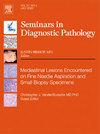Frozen section evaluation of deceased donor kidney biopsies: A field guide
IF 3.5
3区 医学
Q2 MEDICAL LABORATORY TECHNOLOGY
引用次数: 0
Abstract
The demand for donated kidneys is steadily increasing, making it critical that the transplant community maximizes the use of organs procured from deceased donors. When a donated kidney becomes available, a transplant program evaluates the suitability of the organ for their patients and will choose whether to decline or accept. A pre-implantation biopsy may be performed if the transplant center is unsure about the suitability of the organ. More than half of deceased donor kidneys are biopsied prior to implantation, and “biopsy findings” is the most commonly cited reason for a kidney not being accepted for transplantation. This is despite the fact that retrospective analyses at multiple centers have revealed that the results of kidney pre-implantation biopsies are poorly reproducible, inaccurate, and do not correlate with clinical outcomes. A prospective study comparing the scores of paraffin-embedded pre-implantation biopsies given by on-call pathologists to scores given by experienced renal pathologists found that only the evaluation by the renal pathologist was significantly associated with graft function and survival. In 2023, the Organ Procurement and Transplantation Network implemented the Standardized Kidney Biopsy Reporting and Data Collection policy, specifying how kidney pre-implantation biopsies should be scored and reported. This article aims to increase awareness of the reporting criteria for kidney pre-implantation biopsies, thereby increasing the accuracy and reproducibility of the results and decreasing the number of deceased donor kidneys that are inappropriately discarded.
冷冻切片评估已故供体肾活检:现场指南
对捐赠肾脏的需求正在稳步增长,因此,移植界必须最大限度地利用从已故捐赠者处获得的器官。当捐赠的肾脏可用时,移植项目会评估该器官是否适合他们的病人,并选择是拒绝还是接受。如果移植中心不确定该器官是否适合移植,可以进行移植前活检。超过一半的已故供体肾脏在移植前进行了活组织检查,“活组织检查结果”是肾脏不被接受移植的最常见原因。尽管多个中心的回顾性分析表明,肾脏植入前活检的结果重复性差、不准确,且与临床结果无关。一项前瞻性研究比较了随叫随到的病理学家给出的石蜡包埋植入前活检的评分与经验丰富的肾脏病理学家给出的评分,发现只有肾脏病理学家的评估与移植物功能和存活有显著相关性。2023年,器官获取和移植网络实施了标准化肾活检报告和数据收集政策,规定了肾脏植入前活检的评分和报告方式。本文旨在提高人们对肾脏植入前活检报告标准的认识,从而提高结果的准确性和可重复性,并减少因不当丢弃而死亡的供体肾脏的数量。
本文章由计算机程序翻译,如有差异,请以英文原文为准。
求助全文
约1分钟内获得全文
求助全文
来源期刊
CiteScore
4.80
自引率
0.00%
发文量
69
审稿时长
71 days
期刊介绍:
Each issue of Seminars in Diagnostic Pathology offers current, authoritative reviews of topics in diagnostic anatomic pathology. The Seminars is of interest to pathologists, clinical investigators and physicians in practice.

 求助内容:
求助内容: 应助结果提醒方式:
应助结果提醒方式:


